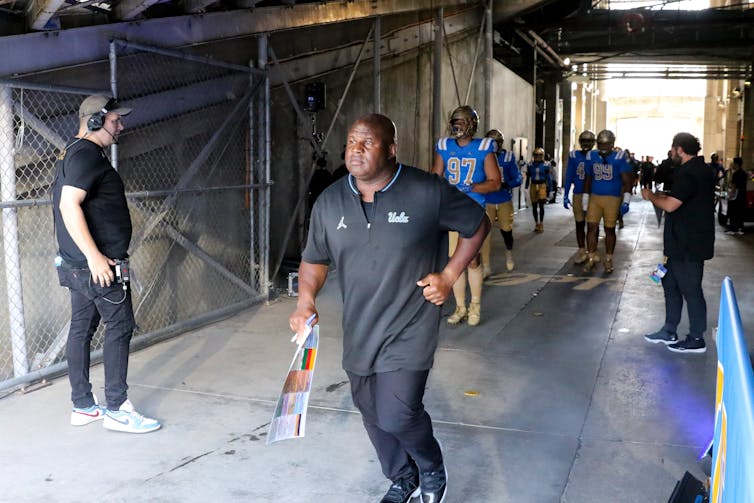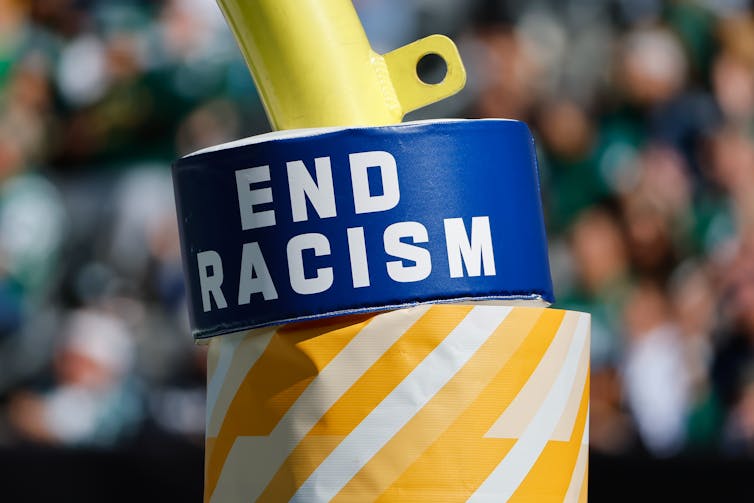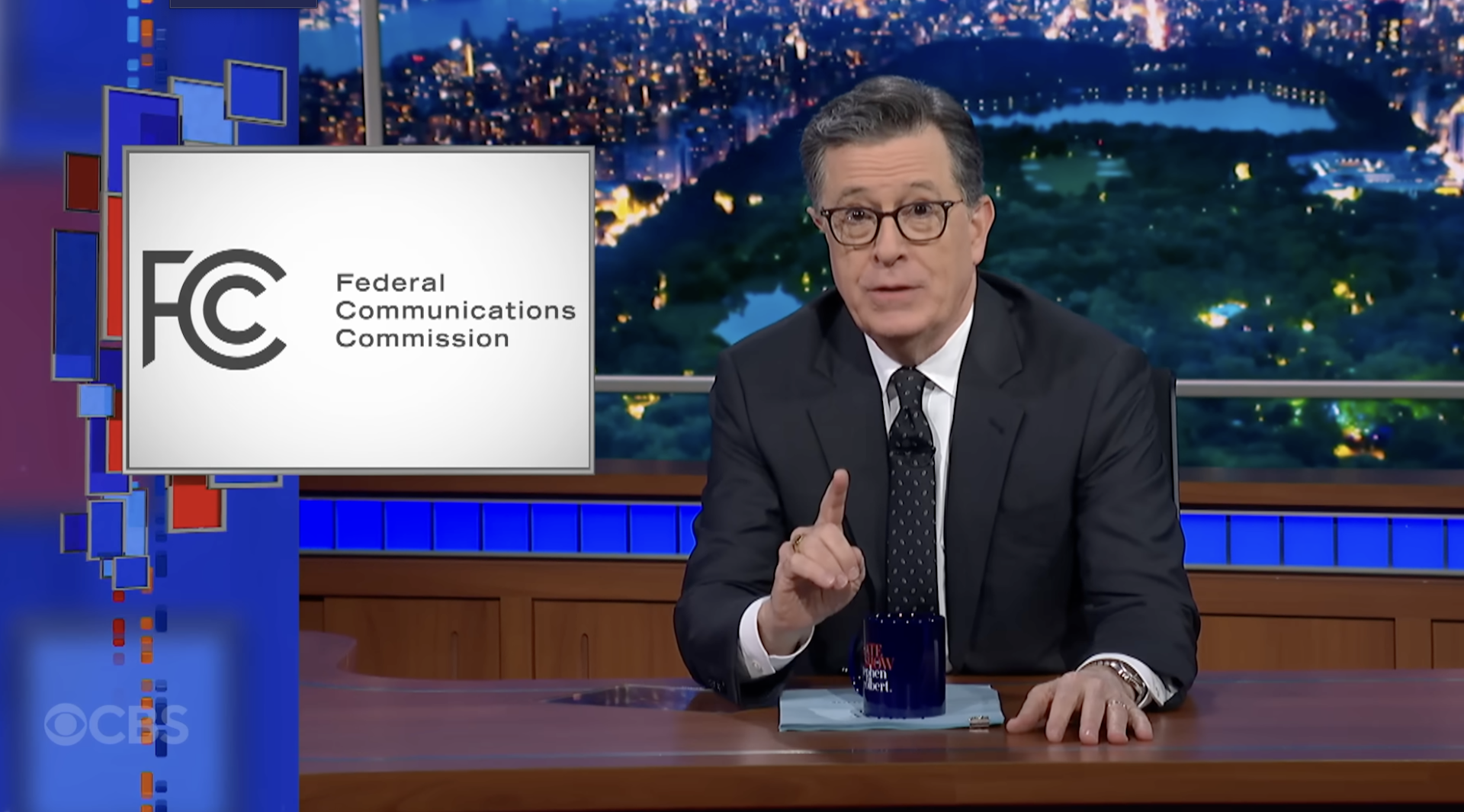The illusion of equal opportunity for minority NFL coaches
The firings of two Black NFL coaches at the end of the 2024 season touched off widespread debate on whether minority coaches face a double standard.
On the day after the New England Patriots ended their NFL season with a miserable 4-13 record, team owner Robert Kraft fired Jerod Mayo, the team’s first Black head coach. In a press conference following his decision, Kraft explained that he put Mayo in “an untenable situation” by hiring him to lead an underperforming team.
Kraft’s assessment reflects an all-too-familiar reality for Black coaches in the NFL. Though Black players account for 53% of all NFL players, only 19% of head coaches are Black men.
At the beginning of the 2024 season, the NFL set its own league record with nine of its 32 head coaching jobs held by minorities. In addition to Mayo, Las Vegas’ Antonio Pierce, Pittsburgh’s Mike Tomlin, Tampa Bay’s Todd Bowles, Atlanta’s Raheem Morris and Houston’s DeMeco Ryans are Black. They were joined by Carolina’s Dave Canales, who is Mexican American, Miami’s biracial Mike McDaniel and the New York Jets’ Robert Saleh, who is of Lebanese descent.
By season’s end, three of those coaches were gone, including the Raiders’ Pierce. Pierce, like Mayo, was given one season to turn around a team with a losing record. Saleh was fired during the season.
In my view as a scholar of race and professional sports, the firings revealed the NFL’s double standard for Black head coaches and suggest that Black men are still valued more for their athletic prowess than their leadership skills.
During a Fox NFL Sunday show shortly after Mayo’s firing, former Patriots tight end Rob Gronkowski called Mayo’s firing shocking, disappointing and “unfair.”
ESPN’s Stephen A. Smith was quick to blame the race of Mayo as a factor. “They call it Black Monday for a reason,” Smith said. “Jerod Mayo was clearly not given a lengthy enough opportunity.”
A checkered history
In 1921, a year after the NFL’s inaugural season, Fritz Pollard became the first Black head coach when he was hired to lead the Akron Pros. It would take nearly 70 years before the NFL had its second Black head coach – Art Shell of the Oakland Raiders in 1989.
Since then, Black coaches have had few chances in the NFL. Even fewer have succeeded. Only two Black head coaches have won Super Bowl titles: Tony Dungy of the Indianapolis Colts in 2007 and Mike Tomlin of the Pittsburgh Steelers in 2008.
To address the lack of Black head coaches, the NFL enacted in 2003 what is known as the Rooney Rule, a hiring practice named after Dan Rooney, the former owner of the Pittsburgh Steelers who sat on the NFL’s diversity committee. The rule requires teams to include two minority candidate during the interview process for head coaching jobs and was later applied to general managers, senior executives and assistant coaches.
But even with the rule, the percentage of Black coaches has consistently been lower than the percentage of Black players. Research has shown that Black coaches are both less likely to be promoted to head coaching jobs than their white counterparts and less likely to receive a second chance after a losing season.
In fact, since the Rooney Rule was instituted in 2003, nonwhite coaches have been more than three times as likely to be fired after one season than white coaches, according to data collected by the USA Today NFL Coaches Project.
Their data did not include the scores of Black assistant coaches who are routinely overlooked for their first head coaching jobs.

Eric Bieniemy, for example, shared two Super Bowl championships as offensive coordinator with the Kansas City Chiefs in 2019 and 2022. Given his experience, he was widely expected by NFL analysts to earn a head coaching job.
In order to pursue that goal, Bieniemy left the Chiefs in 2023 to join the Washington Commanders and was a favorite to become the team’s next head coach. But the Commanders were sold at the end of the 2023 season, and the new owners promptly fired him.
Bieniemy is back in the NFL after being hired in February 2025 by the Chicago Bears as their running backs coach, a lower rank than his prior position as offensive coordinator.
The benefit of the doubt
In 2020, the NFL expressed its support for the Black Lives Matter movement by promoting social justice messages on end zones and players’ helmets. The NFL also hired Roc Nation, Hip-Hop mogul Jay-Z’s company, to manage its music and entertainment.
A year later, the NFL formally ended their decades-long practice of race norming in which the league routinely gave Black players lower baseline cognitive ratings than white players in legal actions related to concussions and subsequent dementia.
But those measures, much like the Rooney Rule, have not closed the racial disparities among NFL head coaches and have not stopped white coaches from appearing to be more likely to receive the benefit of the doubt.

Still unresolved is a 2022 lawsuit filed by Black head coach Brian Flores. Despite posting two winning seasons during his three-year tenure, he was fired by the Miami Dolphins. Flores filed a suit against the NFL, the Miami Dolphins and two other NFL teams alleging widespread racial discrimination and hiring practices.
During an interview with reporters before the 2025 Super Bowl, NFL Commissioner Roger Goodell defended the league’s diversity initiatives, saying, “We’ve proven to ourselves that it does make the NFL better.”
Goodell was quick to point out that the NFL’s diversity efforts do not mean a “quota system” in which a certain number of candidates of each race are hired.
“There’s no requirement to hire a particular individual on the basis of race or gender,” Goodell said. “This is about opening that funnel and bringing the best talent into the NFL.”
Joseph N. Cooper does not work for, consult, own shares in or receive funding from any company or organization that would benefit from this article, and has disclosed no relevant affiliations beyond their academic appointment.
Read These Next
Why Stephen Colbert is right about the ‘equal time’ rule, despite warnings from the FCC
The ‘equal time’ rule has been around for a century and aims to promote broadcasters’ editorial…
As war in Ukraine enters a 5th year, will the ‘Putin consensus’ among Russians hold?
Polling in Russia suggests strong support for President Vladimir Putin. Yet below the surface, popular…
Probability underlies much of the modern world – an engineering professor explains how it actually w
Scientific research, artificial intelligence and modern bank security all rely on probability.






